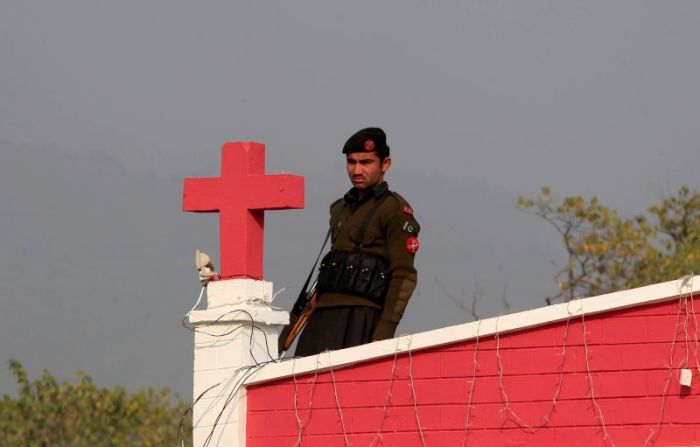Pakistan sentences Christian man to death over allegation he sent blasphemous texts

A trial court in Pakistan sentenced a Christian man to death earlier this week after he was accused of sending blasphemous text messages to his former boss, fueling more criticism against the country’s blasphemy laws that are frequently used to target religious minorities.
Asif Pervaiz, 37, who has been in custody since 2013 when he was alleged to have sent the blasphemous message to a former work supervisor, was sentenced to death by a ruling of a court in the Punjab capital of Lahore on Tuesday.
“The evidence on record was clearly not enough to sentence Asif Pervaiz to death. As usual, trial judges have so far never acquitted anyone accused of blasphemy,” Pervaiz’s attorney Saif-ul Malook told Christian Solidarity Worldwide.
“I hope he will be freed by the High Court where we have filed an appeal. Sadly, Asif will continue to be incarcerated until his appeal is heard.”
Malook previously represented Asia Bibi, a Pakistani Christian mother who was acquitted by Pakistan’s Supreme Court in 2018 who spent nearly a decade on death row after she was accused of insulting Islam. Her case garnered international attention and scrutiny toward the country’s blasphemy laws.
“From my experience in the Asia Bibi case, judges in appeal courts hesitate to hear and decide blasphemy cases,” Malook added. “Cases involving murder are usually decided within three years, but blasphemy charges can take up to over seven years.”
An example is the case of Christian couple Shagufta Kausar and her husband, Shafqat Emmanuel, whose death row appeal was delayed this summer after spending six years in prison for blasphemy. They were accused by a local imam of sending a text message insulting the Islamic prophet Muhammad.
“We are very concerned by the trial court’s decision to sentence Mr. Pervaiz to death,” stated Mervyn Thomas, the chief executive of CSW, a London-based human rights watchdog organization that monitors instances of persecution in over 20 countries.
“Pakistan’s harsh blasphemy laws have proven to be a source of suffering for many, and are regularly abused. Mr. Pervaiz now has to endure further, indefinite imprisonment, given the nature of blasphemy charges and the social interests surrounding it.”
The complainant in Pervaiz’s case is Saeed Ahmed Khokhar, his former supervisor at the garment factory he worked at. Khokhar accused Pervaiz of sending several blasphemous messages to his phone.
Under Section 295 of Pakistan’s legal code, blasphemy is punishable by life in prison or even death.
In denying the accusation, Pervaiz maintains that he was accused of the crime after refusing Khokhar’s pressure that he convert to Islam.
In Pakistan, more than nine out of every 10 people are Muslim.
Pervaiz said during an earlier court hearing that he was confronted by Khokhar after he quit working at the factory.
Khokher’s lawyer, Ghulam Mustafa Chaudhry, said in an interview with Al Jazeera that his client denies pressuring Parvaiz to convert and argued that there were other Christian employees of the factory but none of them were accused of proselytizing.
"He has taken this defense after the fact because he had no other clear defense," Chaudhry was quoted as saying. "That's why he accused him of trying to convert him."
The National Christian Party of Karachi held a one-day hunger strike on Wednesday to show solidarity with Pervaiz and other Christians accused of blasphemy in Pakistan.
“These cases and false accusations are totally based on discrimination," NCP President Shabbir Shafqat told Asia News. "I am very afraid for the future of minorities in Pakistan. These cases are driving many minority members to leave the country. We must pray for our nation, for the police in Pakistan and for the judicial system. "
In its annual report, the U.S. Commission on International Religious Freedom said that it is aware of nearly 80 individuals who are imprisoned for blasphemy and at least half of them are facing life sentences or the death penalty.
In December 2019, just over a year after Asia Bibi's acquittal, university lecturer Junaid Hafeez was sentenced to death after he was accused of blasphemy following an Islamic student group taking issue with his liberal teaching. He has been in prison since 2013.
According to USCIRF, Pakistan’s blasphemy laws create a culture of impunity for violent attacks against religious minorities following accusations.
“In March 2019, a student murdered professor Khalid Hameed over perceived ‘anti-Islamic’ remarks,” the report reads. “Protestors in Sindh attacked and burned Hindu shops and houses of worship following two incidents: in the first, a cleric accused a Hindu veterinarian of wrapping medicine with paper printed with Qur’anic verses; in the second, a student leveled blasphemy charges against a Hindu principal. A mob also attacked a Christian community in Punjab after a mosque claimed over its loudspeaker that the community had insulted Islam.”
In March 2019, it was reported that over 200 families were forced to flee their homes in Karachi after Christian women were falsely accused of blasphemy even though none of the charges were true.
In 2018, the U.S. State Department added Pakistan to its list of countries of particular concern, which designates governments that have “engaged in or tolerated systematic, ongoing and egregious violations of religious freedom.”
At its international religious freedom ministerials in 2018 and 2019, the State Department released statements signed by several other countries condemning blasphemy and apostasy laws that they say are “inconsistent with the Universal Declaration of Human Rights and the International Covenant on Civil and Political Rights.”
The countries also declared that such laws “impede the freedom of individuals to choose a faith, practice a faith, change their religion, not have a religion, tell others about their beliefs and practices, or openly debate and discuss aspects of faith or belief.”
Pakistan is ranked as the fifth-worst country in the world when it comes to Christian persecution on Open Doors USA’s 2020 World Watch List.
Follow Samuel Smith on Twitter: @IamSamSmith
or Facebook: SamuelSmithCP





























